Despite prolific success both on track and in showrooms, in 2017 Honda pulled-the-plug on the CBR600RR in Europe. A maturing and fast-changing market allied to tightening EU emissions regulations made the decision relatively easy for the Japanese manufacturer, but sportbike fans from Madrid to Manchester were gutted because the CBR was a fantastic bike. A highly evolved RC213V for the masses; a pocket rocket that oozed HRC thinking and quality. It was missed.
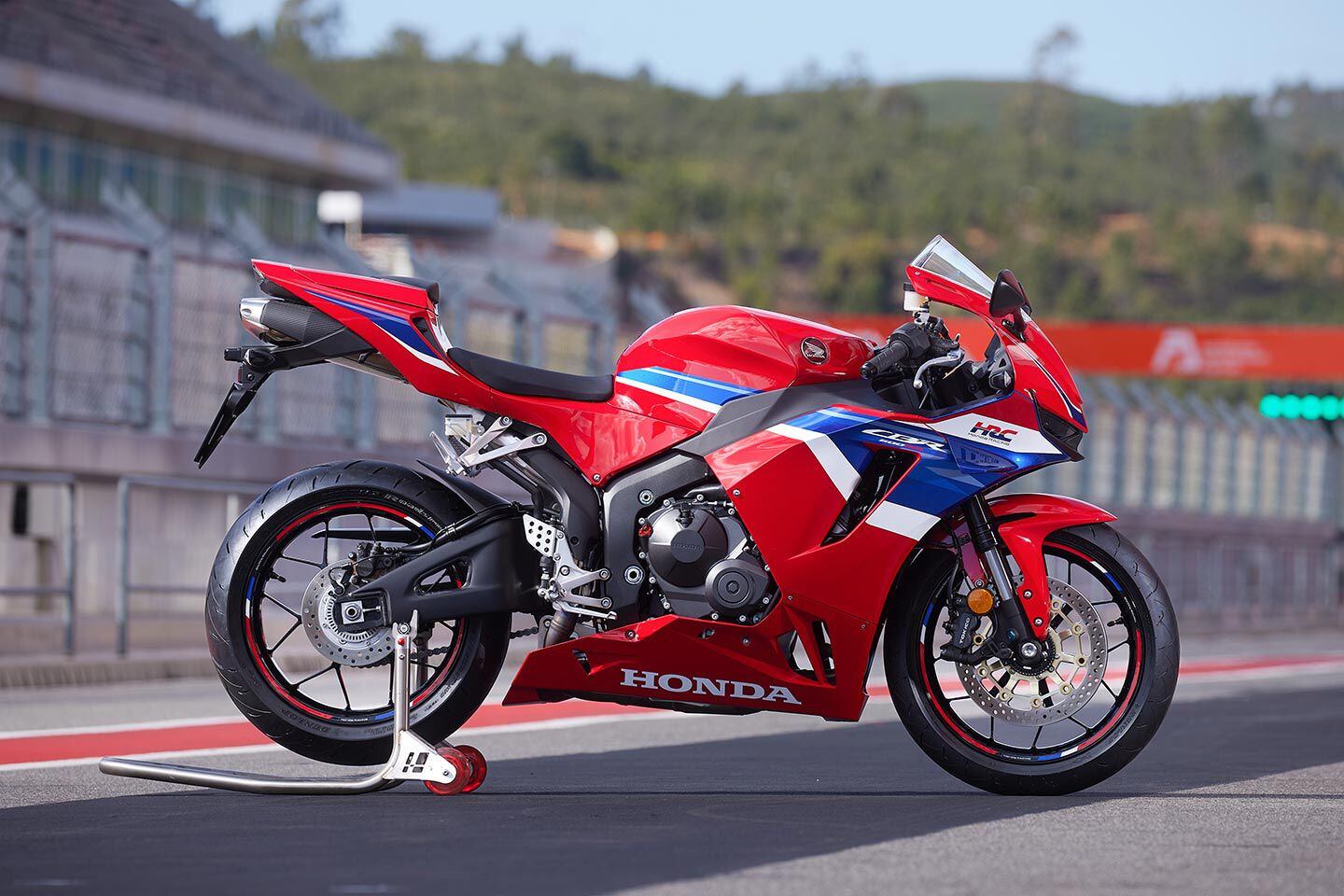
By 2021, however, there was hope on the horizon when Honda reintroduced the 600cc inline-four to the Japanese market, and bikes started to appear in racing—notably in World Supersport and on the roads at the Isle of Man TT, on bikes imported to the UK by Padgett’s Motorcycles. And now, finally, for 2024, Honda has decided to reintroduce it.
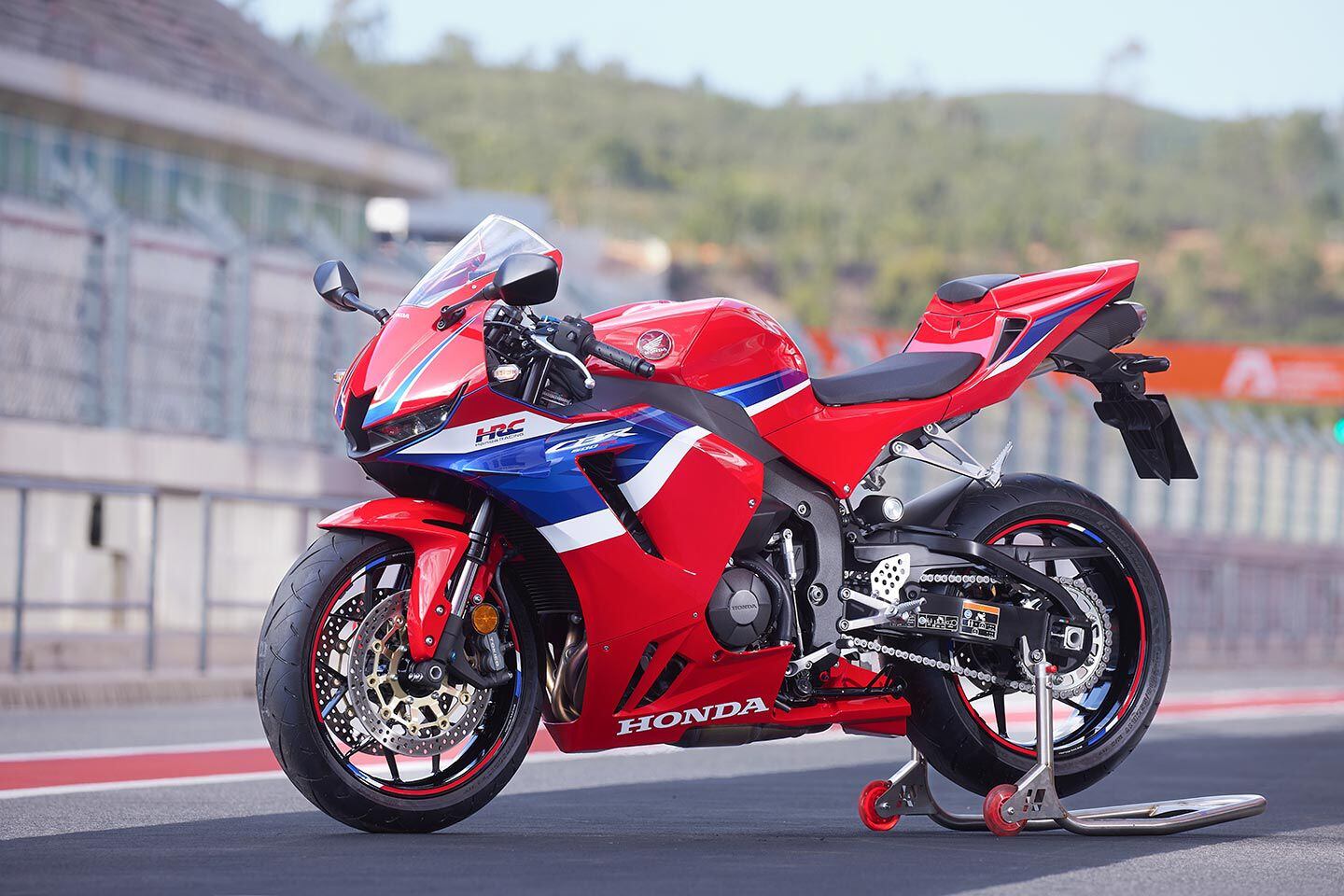
Editor’s note I: this CBR600RR won’t be imported into the U.S. for the 2024 model year (read the Honda’s Updated 2024 CBR600RR Not Coming to America article). Interested in the previous version? Read and watch the 2020 Honda CBR600RR ABS MC Commute Review article and video.
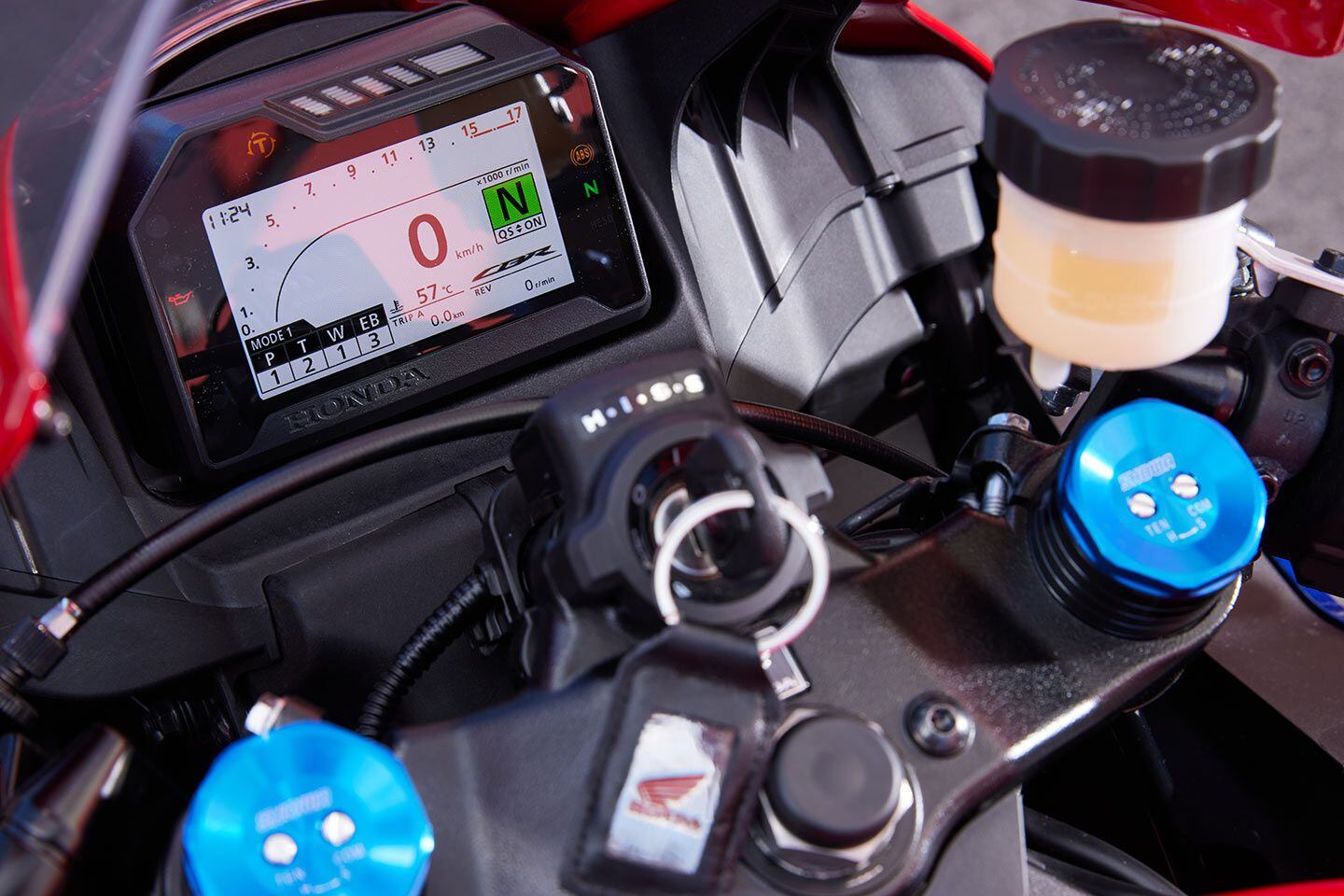
As you can imagine for a bike that has essentially been left untouched since 2017, there was a lot of work involved to bring it up to modern standards. The old CBR had no electronic rider aids, no clever six-axis IMU, no aero package, and didn’t even comply with now-obsolete Euro 4. But thankfully Honda has done it, and we flew to the very fast and demanding Portimão track in Portugal to put the reborn screamer through its paces.
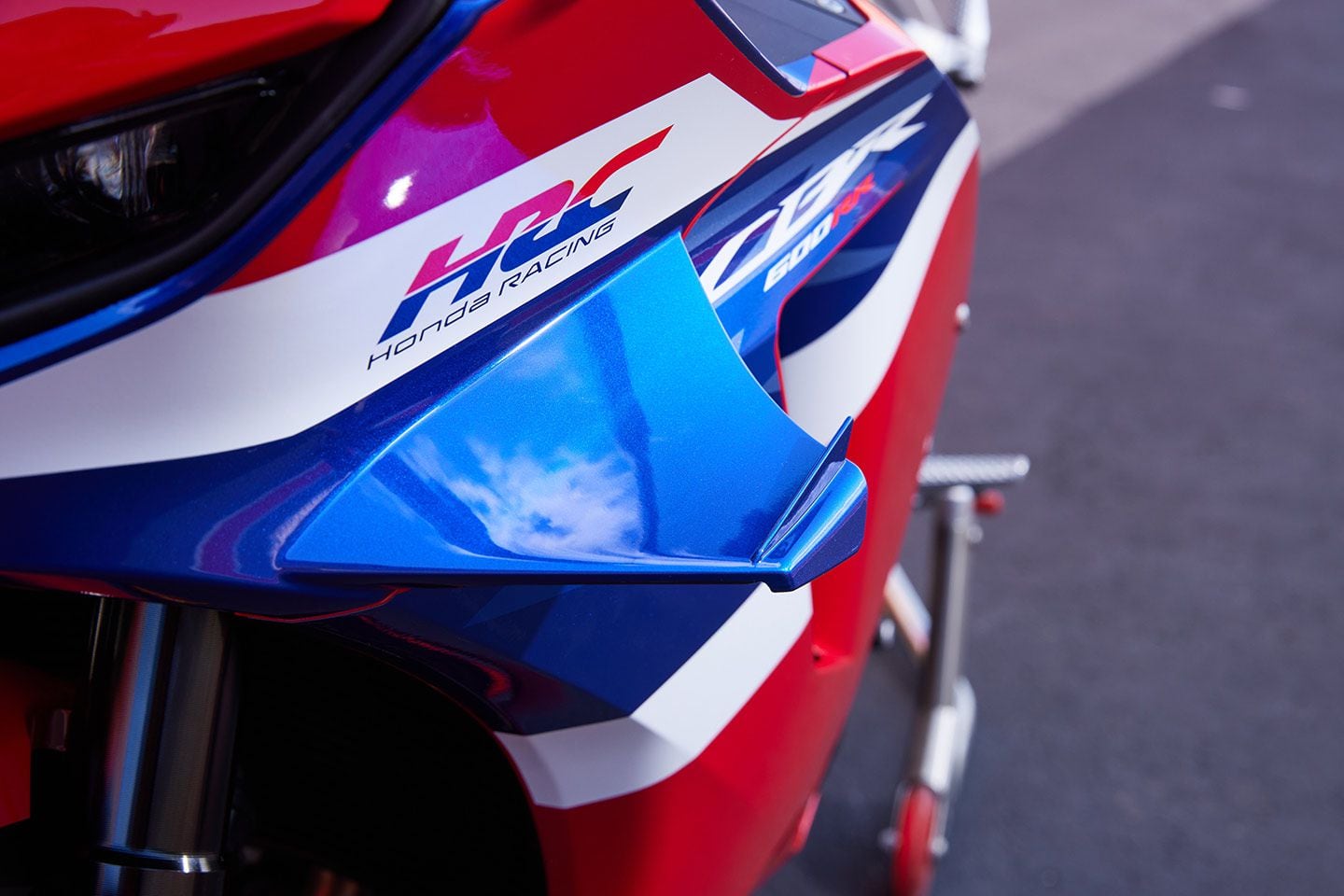
Last seen in Europe in 2017, the CBR600RR looked to be passing into history. If you wanted to see one in recent times, the Honda Collection Hall at Motegi was increasingly likely to be the place. But rather than let it become a museum piece, Honda has dusted down its defining sport middleweight and completed the mammoth task of making it Euro 5+ compliant while preserving its legendary high-revving performance and delivering it to the street and track with state-of-the-art electronics on a par with the new 2024 CBR1000RR-R Fireblade.
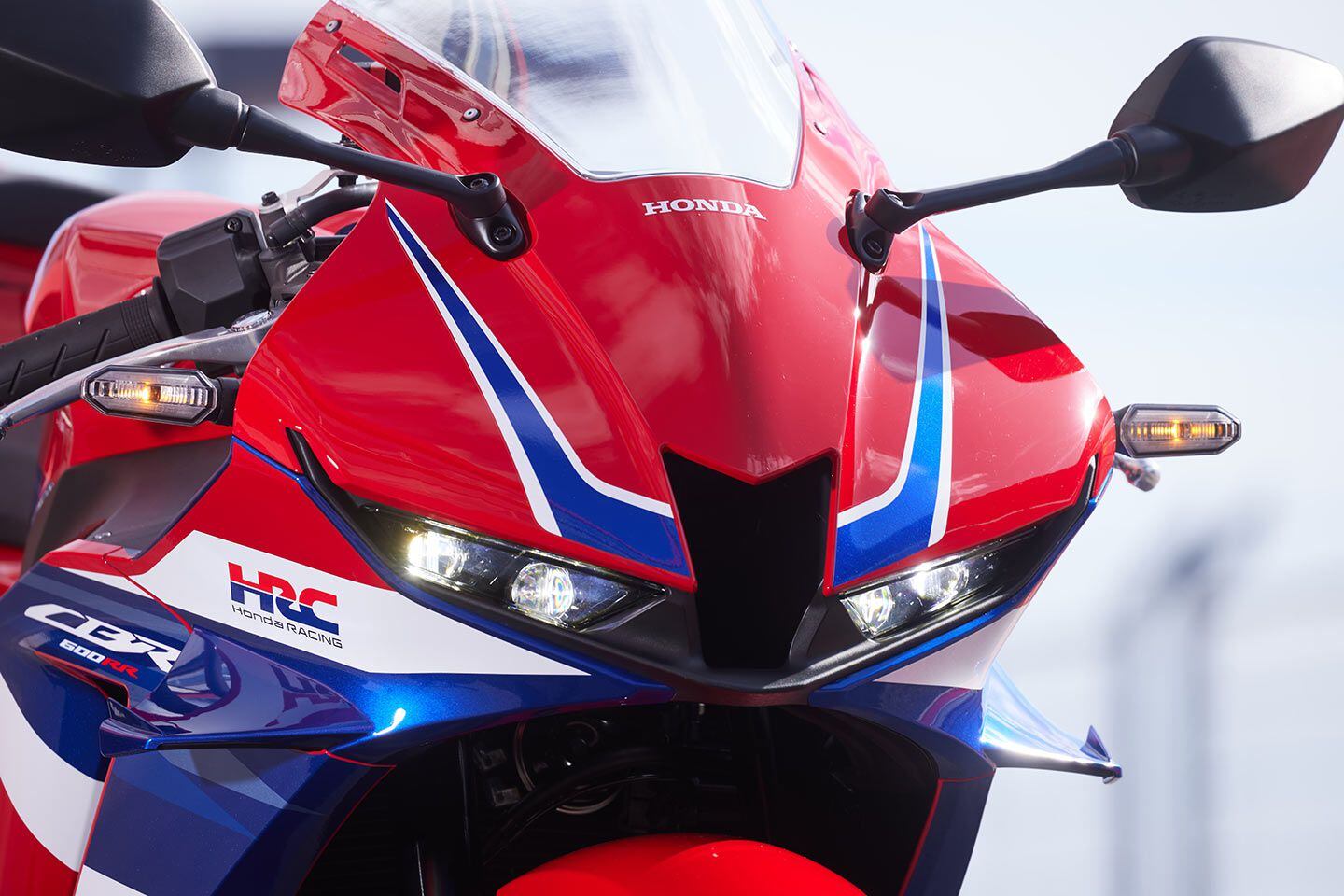
Editor’s note II: we last test rode the CBR1000RR-R during the 2021 Honda CBR1000RR-R Fireblade SP First Ride Review article and 2021 Honda CBR1000RR-R Fireblade SP MC Commute Review articles and videos.
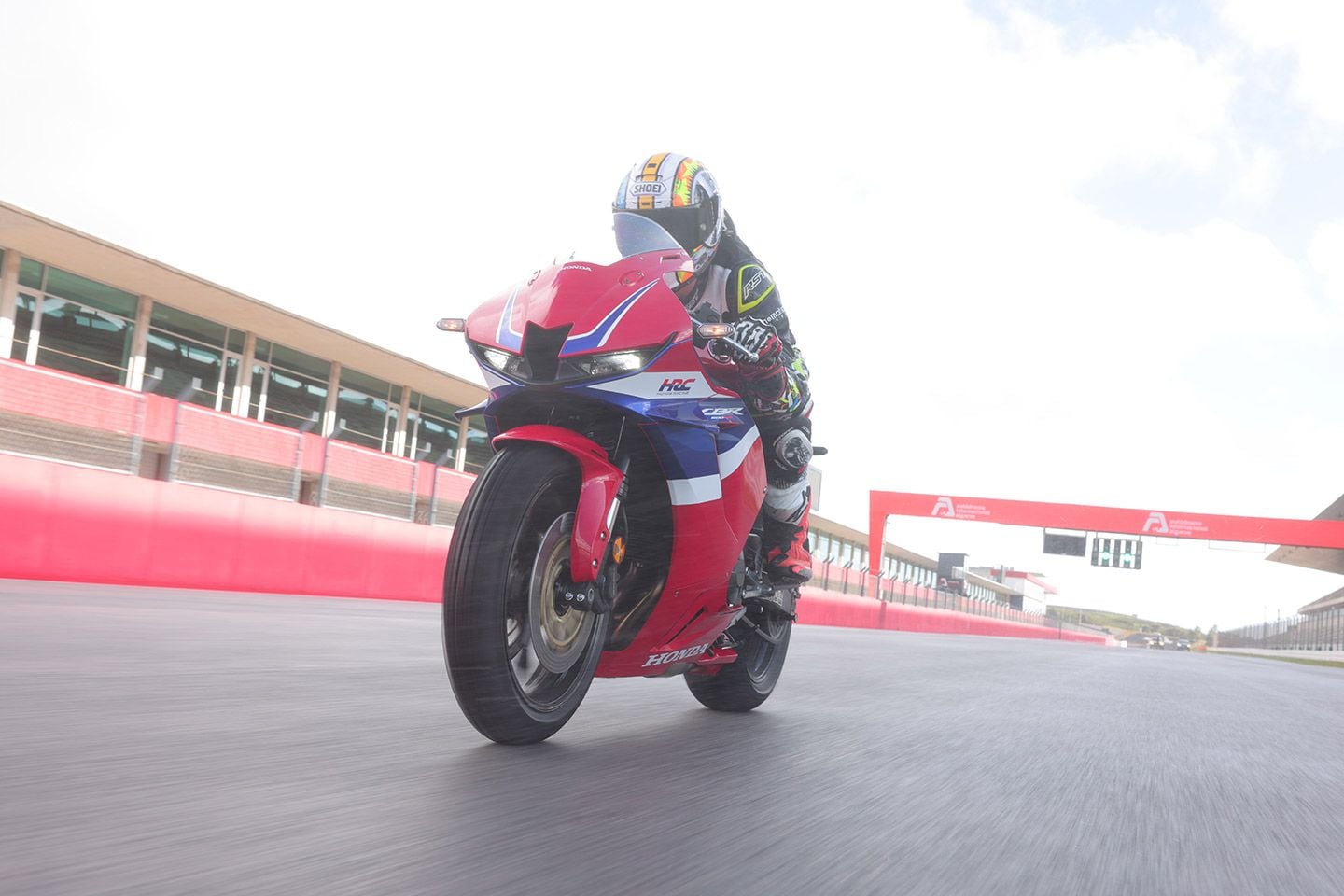
The inline four-cylinder layout remains, as does the same massively oversquare 67 x 42.5mm bore and stroke and 12.2:1 compression ratio. The throttle bodies, however, have gone up 4mm to 44mm, cam timings are revised, and a new exhaust system does much of the heavy lifting in terms of hitting Euro 5+. (Honda says more than 50 prototype systems were tried before its engineers were happy.)
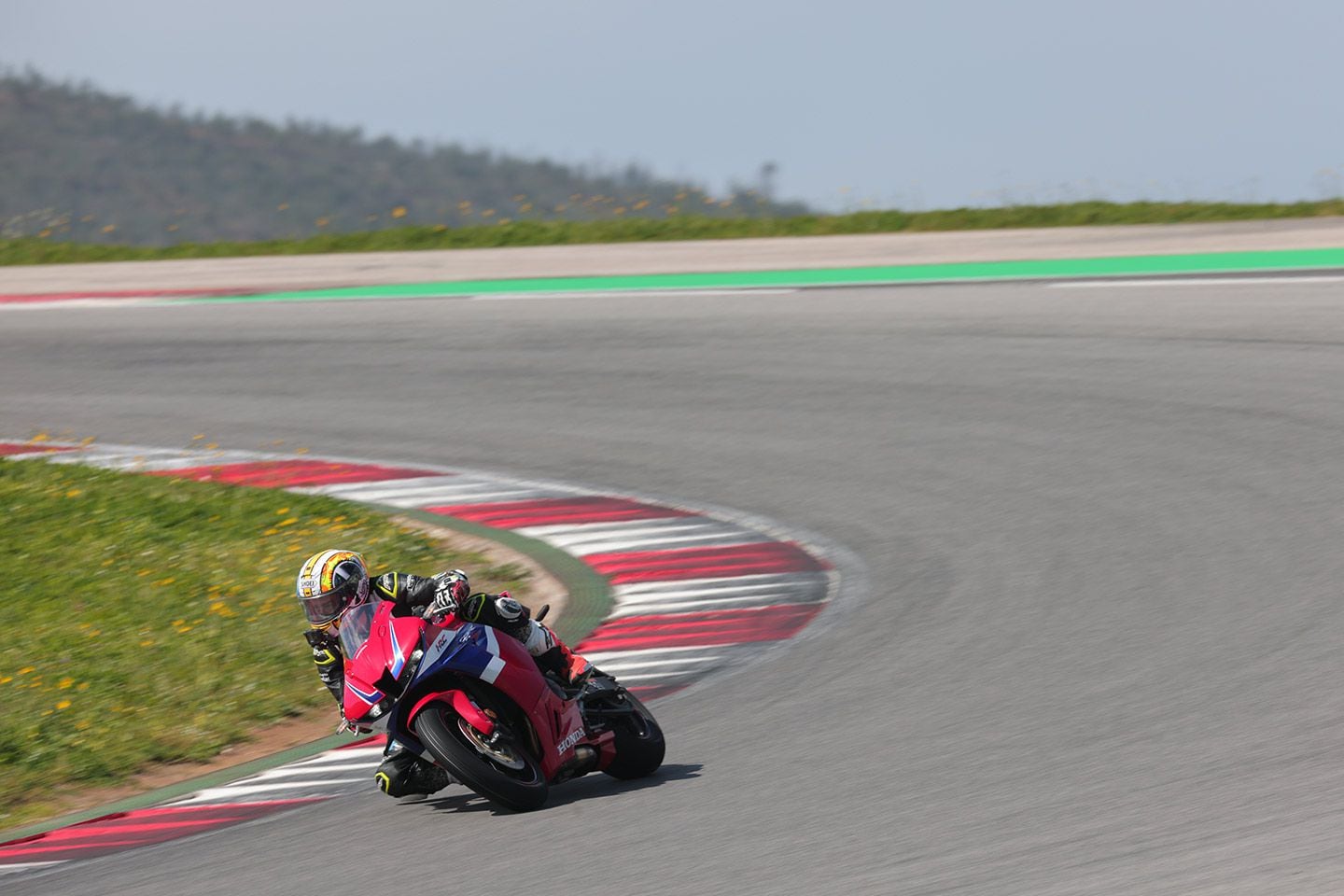
Improved gas flow at (very) high rpm was the main performance goal, and despite the strangling effect of those emissions regs, peaks of 119.4 hp (89kW) at 14,250 rpm and 46.5 lb.-ft. (63 Nm) at 11,500 rpm are similar to the far less restricted 2017 model, which is impressive indeed.
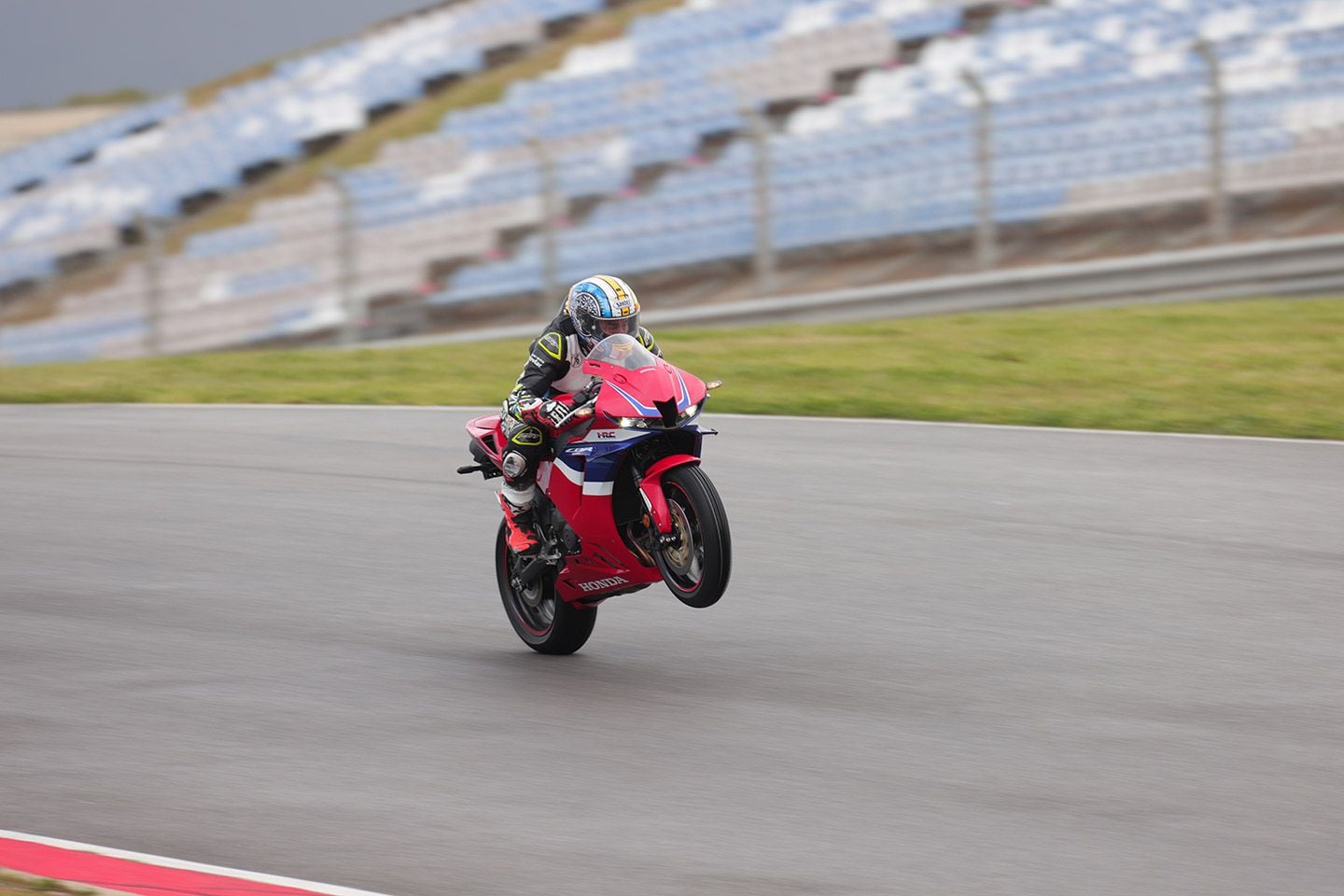
Controlling that frenzy of revs and horses is an array of electronics and rider aids the old bike couldn’t even have dreamt of: nine levels of traction control (HSTC), five riding modes, five power modes, engine brake control, wheelie control, rear lift control, cornering ABS some 2.4 kilograms/5.5 pounds lighter than the non-cornering ABS hardware on the 2017 model, and an up-and-down quickshifter with three levels of adjustment. It should also be noted that the 2024 model gets the six-axis IMU similar to that installed in the new CBR1000RR-R SP Fireblade and not the five-axis IMU used in CBR600RRs sold in Japan since 2021.
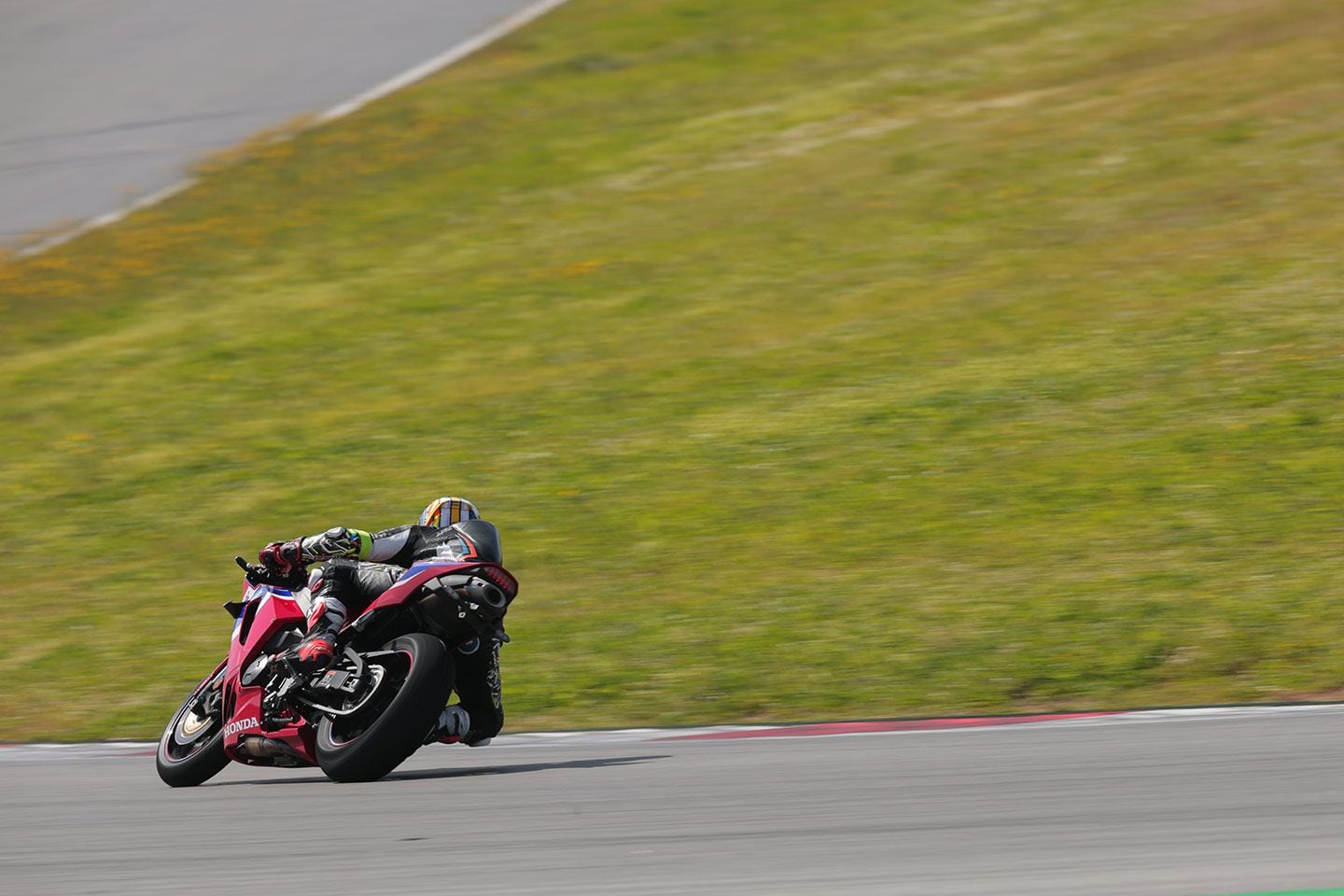
Chassis-wise, Honda hasn’t reinvented the wheel as it simply didn’t need to. That familiar-looking aluminum twin-spar frame remains as before, though the wheelbase is shortened by 5mm/0.2 inch to 1,370mm/53.9 inches, while rake and trail go out from 23 degrees and 98mm/3.85 inches, respectively, to 24 degrees and 100mm/3.94 inches. The swingarm is 150 grams/5.3 ounces lighter than before while Showa suspension, a CBR hallmark for decades, is fully adjustable with its 41mm-diameter Big Piston fork now 15mm longer than before to allow riders to experiment with front end setup should they wish to. Brakes are Tokico and use twin 310mm discs and four-piston calipers at the front and a 220mm disc at the rear. Honda is quoting a mass of 193 kilograms/425.5 pounds including fuel, which is 3 kilograms/6.6 pounds lighter than the 2017 machine.
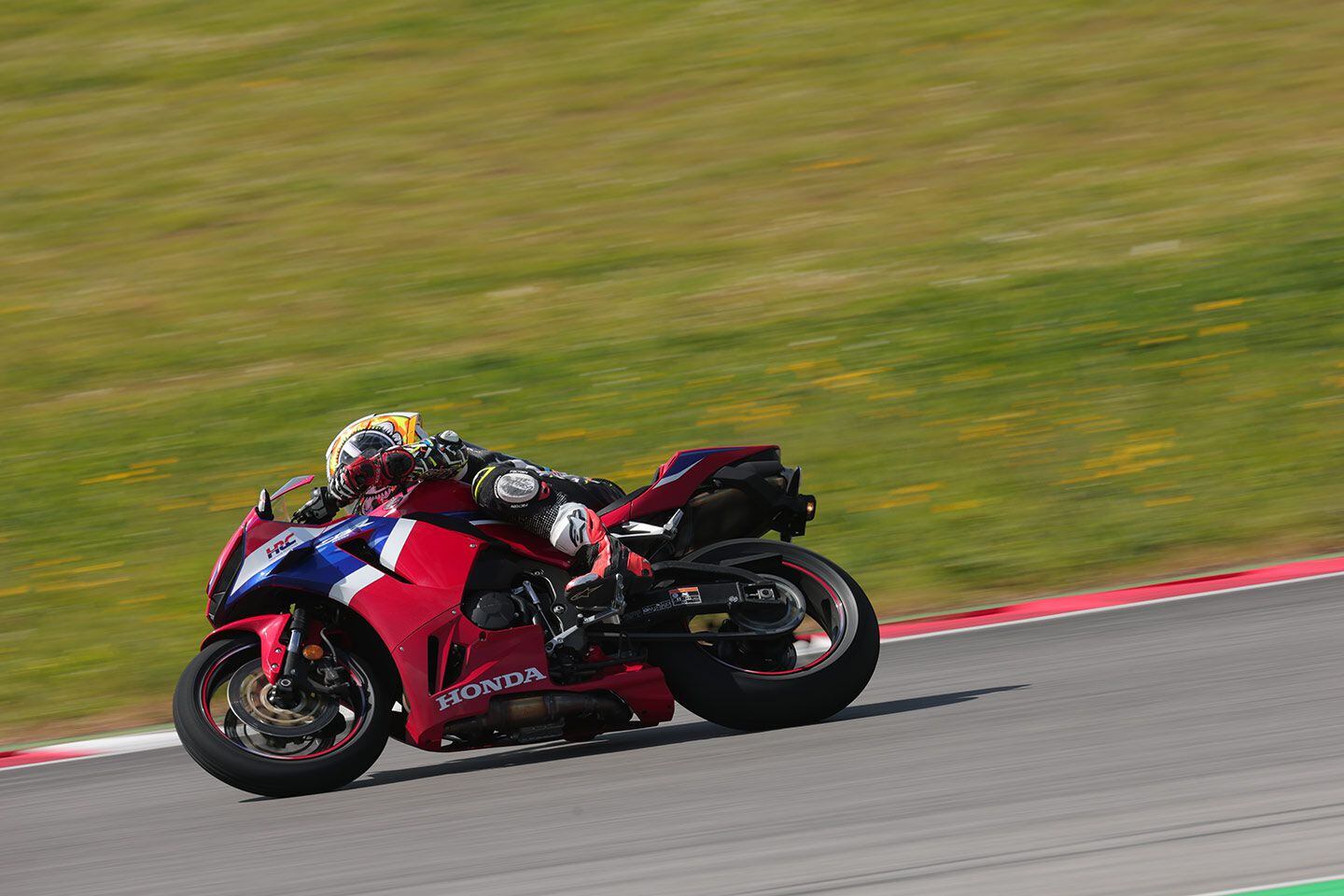
Those distinctive wings tell everyone you have a 2024 CBR600RR, but the new fairing is not just about downforce: Honda claims it has the lowest drag coefficient in this class, and the wings are more for stability rather than wheelie control. The fuel tank is mounted 10mm lower which means, in theory, that it’s easier to get tucked in.
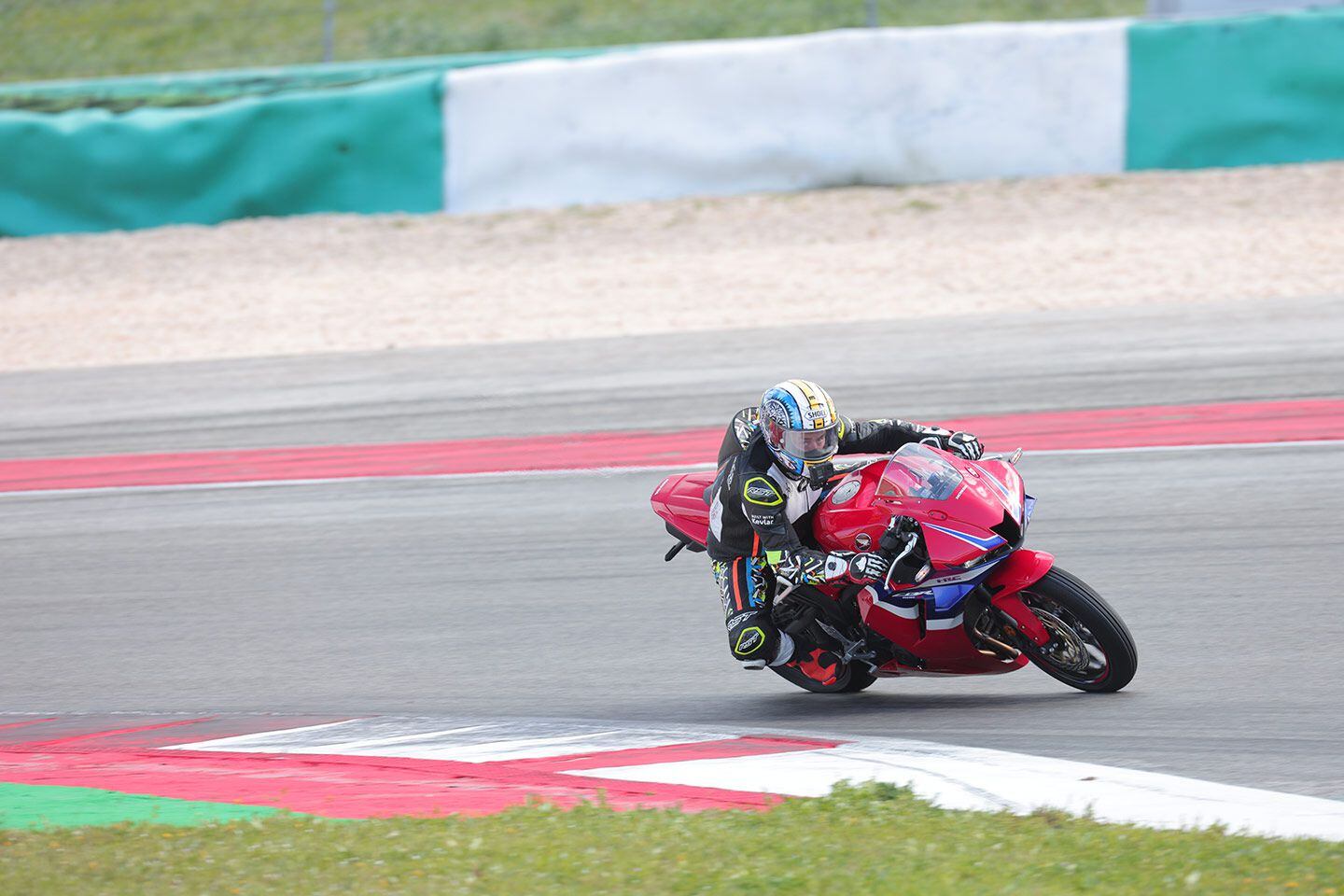
We didn’t have the best of riding conditions in Portugal. Heavy rain stopped for just long enough to create a drying line before heavy rain arrived again. But this did give us a real-world trackday test of the new CBR600RR, particularly its new suite of electronics.
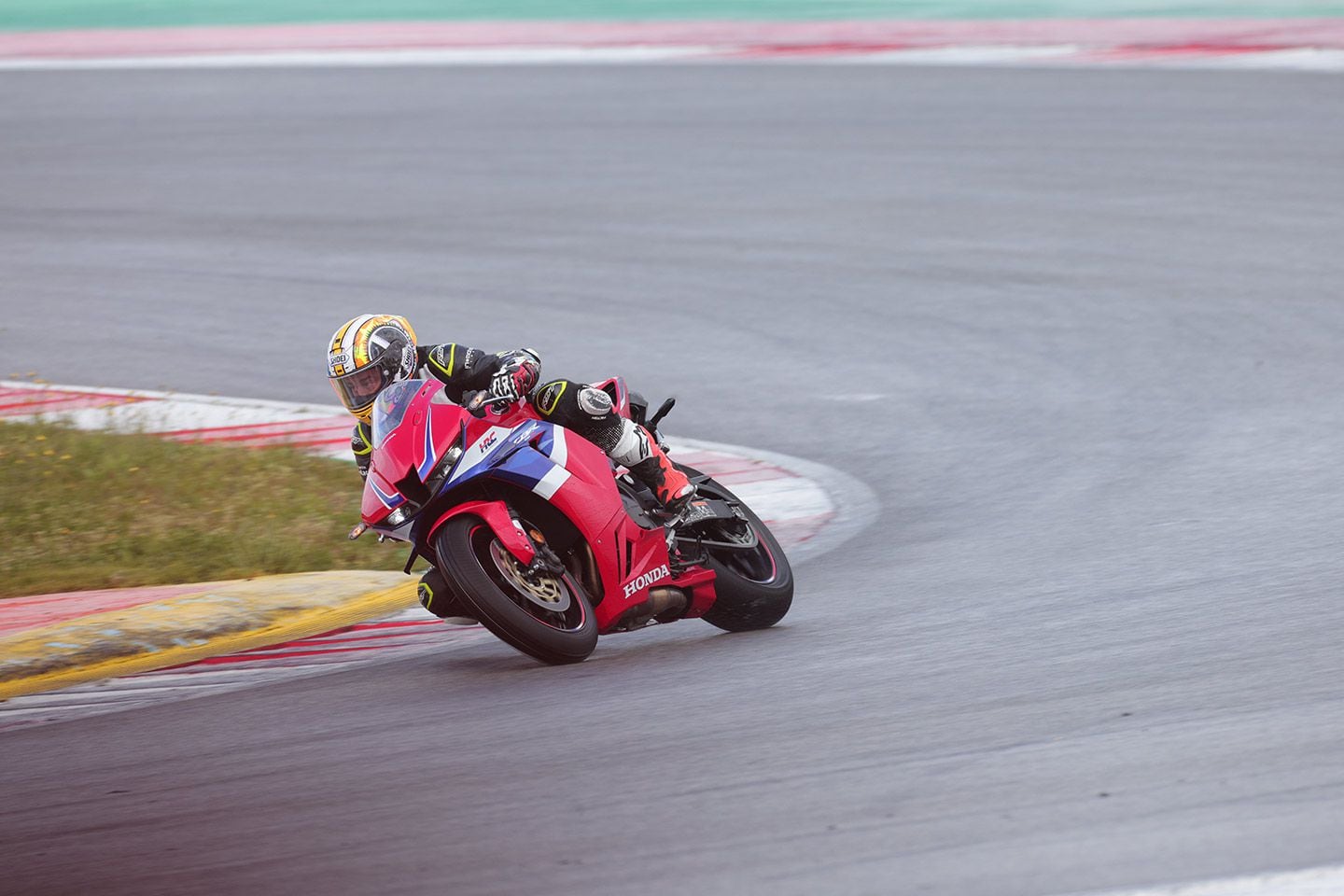
When the heavy rain hit, our CBR—shod with full-wet Pirelli race rubber—was set up with a power reduction and extra traction control with, of course, cornering ABS in support. If this had been the old bike, it would have been a case of biting the screen and hoping for the best; now, with the lean-sensitive rider aids working in the background, I could concentrate on the line while riding safely and enjoying the CBR. Yes, you can still crash it, but jumping on the stoppers for the challenging turn 1 at the end of the straight without worrying about washing out the front felt like progress to me.
Riding in the wet and tricky conditions also allowed me to get a feel for the new CBR at a less than flat-out pace. In many ways, it feels just like the old bike, which is a huge compliment, with a familiar, poised riding position, matched to a compact and lightweight chassis, with plush suspension that gives forensically good feel in the wet. The power delivery in the lower-power mode felt user-friendly—dare I say, a little too soft—but the quickshifter was as fast and effortless as a racebike’s.
As the laps rolled by, the CBR encouraged me to push toward knee-down levels of lean, despite the heavy rain. As it always has, the chassis feedback gives you the confidence to push, to generate heat in the tires, the difference being that there are now rider aids ready to rescue you. These really are a game-changer for the CBR in tricky conditions.
A drying line that was dry enough to tear up the Pirelli wets appeared for sessions two and three of our test, allowing me to turn the traction control to its minimum setting, switch off the wheelie control, select full power mode, and explore more of the CBR’s potential. Now it felt like a supersport racebike with headlights. The free-revving inline-four is a joy to thrash to its peak power point just beyond 14,000 rpm, and that super-quick quickshifter ensures the rpm doesn’t drop out of the hot zone between 9,000 rpm and 14,500 rpm. Allow the revs to fall below 8,000 rpm and the CBR still pulls but feels flat and fractionally off the pace. Better to be brutal: to change up only when the shift lights blink and keep that jewel of an engine spinning on back shifts.
Once you click into this racer mentality, it’s so much fun. Yes, the CBR’s been away for a while but dropping your chin on to the (lower) fuel tank, body tucked in behind a small screen, revs approaching 14,000 rpm in fifth gear at the end of the home straight, and then sitting up and jumping on the stoppers never goes out of fashion.
The CBR is rapid, its corner speed as high if not higher than a Fireblade’s, but with 119 hp instead of 215 hp, it’s a less physical experience with more time to plan and be accurate. The steering is light, predictable, and easy. I’m unsure if it’s the added wings or HESD electronic steering damper or revised chassis geometry making the biggest difference, but for such a lightweight bike, the new CBR feels even more planted than the old. It remained completely unfazed by the demanding undulations of Portugal’s roller coaster of a racetrack. In fact, with the wheelie control turned off, the CBR produced effortless and controlled wheelies over the circuit’s famous crests.
Another enduring CBR600RR quality is its excellent feedback. There’s so much of the stuff on the new bike that I could push a little harder each lap as conditions improved. Sometimes a little guesswork is necessary in the damp—you react to slides and try and control the bike—but on the CBR I knew precisely where the limits were, and just gave myself a small safety margin to stay safe.
Some bigger riders simply don’t fit sport 600s, of course, and the Honda is no exception. I’m nearly 5 feet, 8 inches so the compact riding position of the CBR didn’t bother me. But even as a short rider, it’s evident that the screen is extremely low and the pegs-to-bars-to-seat triangle is tight. It’s not a small bike per se but those over 6 feet tall might need to change the handlebar position and possibly the pegs too. And even I would like a taller screen, just to make life easier, especially on a fast track like Portimão.
Sadly, we didn’t get a perfectly dry track to push the CBR’s handling limits, but if a bike works in the wet, that performance usually translates to the dry. However, while we know the Tokico brakes are strong, we don’t know whether the ABS assistance will kick in too early when there’s loads of grip. And we didn’t get enough time to play around with the multiple rider aids or experiment with the engine-brake assist. The setup options are countless and deserve the time we simply did not have.
When Honda pulled the plug on the CBR600RR in 2017, fans of supersport 600s were left disappointed and slightly confused. After all, it was a thing of sporting beauty and the trackday choice of purists the world over. Thankfully, the CBR is not only back but is better than ever.
Despite the engineering challenges created by Euro 5+, its wicked inline-four still revs like a maniac and, power-wise, feels as strong as ever. Here is a bike that doesn’t pamper to the midrange or try to impress with its low end grunt but instead simply loves to be thrashed. And now shorter gearing and a slick quickshifter allow you to squeeze out every last horsepower.
The chassis is very much like the old bike’s: easy to ride, forgiving, predictable, stable, and light. It’s such an easy bike to push to the limit, certainly far easier than a 1,000cc superbike, and in many ways more rewarding.
The rider aids set the new CBR above the old bike, especially in damp and tricky conditions. New or inexperienced riders will welcome the added safety net these bring, and while some riders will switch most of them off immediately, many others will prefer to have electronic options to help maximize their enjoyment, especially when the weather conditions deteriorate or the rear tire is smoked at the end of a few days on track.
What can’t be measured is the sheer fun of riding the CBR600RR, especially around a challenging race circuit like Portimão. Fast and absorbing without being intimidating or scary, even more so now knowing you have a network of state-of-the-art electronic rider aids to straighten things out should you get carried away, thrashing a 2024 CBR on track is one of the most enjoyable experiences you can have on two wheels. Thanks, Honda, for doing the right thing and bringing it back.
2024 Honda CBR600RR Technical Specifications and Price
| PRICE | N/A |
|---|---|
| ENGINE | 599cc, DOHC, liquid-cooled inline-four; 16-valve |
| BORE x STROKE | 67.0 x 42.5mm |
| COMPRESSION RATIO | 12.2:1 |
| FUEL DELIVERY | Dual-stage fuel injection w/ 44mm throttle bodies |
| CLUTCH | Wet, multiplate slipper; cable actuation |
| TRANSMISSION/FINAL DRIVE | 6-speed/chain |
| FRAME | Twin-spar aluminum |
| FRONT SUSPENSION | 41mm Showa BP inverted fork, spring preload, compression, and rebound damping adjustable; 4.7 in. travel |
| REAR SUSPENSION | Showa Pro-Link, spring preload, compression, and rebound damping adjustable; 5.0 in. travel |
| FRONT BRAKES | Radial-mount 4-piston calipers, 310mm floating discs w/ cornering ABS |
| REAR BRAKE | 1-piston caliper, 220mm disc w/ cornering ABS |
| WHEELS, FRONT/REAR | Die-cast aluminum; 17 x 3.5 in. / 17 x 5.5 in. |
| TIRES, FRONT/REAR | Dunlop Roadsport 2 (race wets used on test); 120/70-17 / 180/55-17 |
| RAKE/TRAIL | 24.0°/3.9 in. |
| WHEELBASE | 53.9 in. |
| SEAT HEIGHT | 32.2 in. |
| FUEL CAPACITY | 4.8 gal. |
| CLAIMED CURB WEIGHT | 425 lb. |
| WARRANTY | TBA year, unlimited mileage |
| AVAILABLE | TBA |
/cloudfront-us-east-1.images.arcpublishing.com/octane/K25WVPRMCVEDZJ7ZJK4BWE374Y.jpg)

